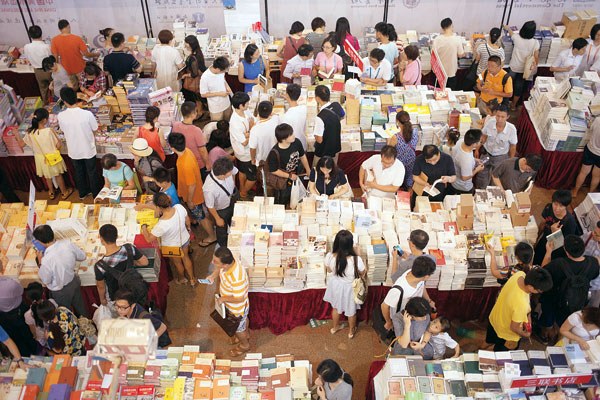 |
| More people visited the recently-ended Shanghai Book Fair than in previous editions.Gao Erqiang/Shanghai Star |
The 10th installment of the wildly successful Shanghai Book Fair has just come to a close.
The Shanghai Book Fair has received a record number of visitors, proving that no matter whether it is on paper or on screen, reading is still considered cool in the city.
The fair, which ran from Aug 13 to 19 at the Shanghai Exhibition Center, is now in its 10th year, and had no problems pulling a crowd. The organizers almost got a warning from the city police, because the crowds threatened to exceed the number permitted before public security becomes a concern.
In order to cater to the huge numbers, the fair had to extend its daily opening hours to 9 pm on weekdays and 10 pm on the weekend.
Guo Jingyang, a spokeswoman for the fair, said exhibitors and publishers all reported an increased number of visitors and sales volumes, though she declined to reveal official statistics.
"We need to focus on improving the value and the quality of the fair's events," Guo says.
More than 500 publishers brought 150,000 books—both paper and digital—to the fair. About 1,000 authors, scholars and celebrities presented 600 events.
Enthusiastic readers lined up at the gates of the exhibition halls, at book readings and signings. Even the canteens serving food had crowds of people.
Yu Yuying, an 82-year-old retiree, visited the fair despite her cataracts making reading difficult. She says "it would be a pity" if she had not come, as she spends most of her time reading, and has bought enough books to fill two shelves.
She says The Gadfly by Irish writer Ethel Lillian Voynich and How the Steel Was Tempered by Russian writer Nikolai Ostrovsky were popular books in her younger years. She says her interest in philosophy and literature has helped her to live a better life and be a better person.
Wu Xuan, 41, browsed the children's book section, checking out the picture books. She is a writer from the Guangxi Zhuang autonomous region who says children should read printed books, rather than digital devices, as they are too easily distracted staring at the bright screen.
Wu herself does not mind digital books, or paying for digital content, but she prefers buying her books in a brick-and-mortar store. "I enjoy the feeling of the paper, and the smell of the print," Wu says. She usually visits bookstores once a fortnight.
Although younger readers admit to spending long hours on the Internet, they complain that reading on mobile phones and other devices exhausts the eyes. Wang Haoran, a 17-year-old middle-school student, says that reading digital books "feels like playing". Xia Qianhui, a 15-year-old, says free books available on the Internet often contain mistakes or are incomplete.
Han Weidong, director of Shanghai Translation Publishing House (STPH), a leading player in the introduction of foreign books in China, says digital reading is an extension, not the enemy, of the traditional publishing industry. Whether on a mobile device or paper, it is the mission of a publisher to provide readers with high-quality content, he says.
At present, sales revenue from digital books is no more than 4 percent of income at STPH, but Han and his colleagues are very aware of the prospects for digital publishing and are ready to present their best products on a digital platform.
STPH started its digital publishing service three years ago, and Han says that now "all our best-selling and latest publications are available in digital editions–as long as writers grant us the digital copyright".
We recommend:
